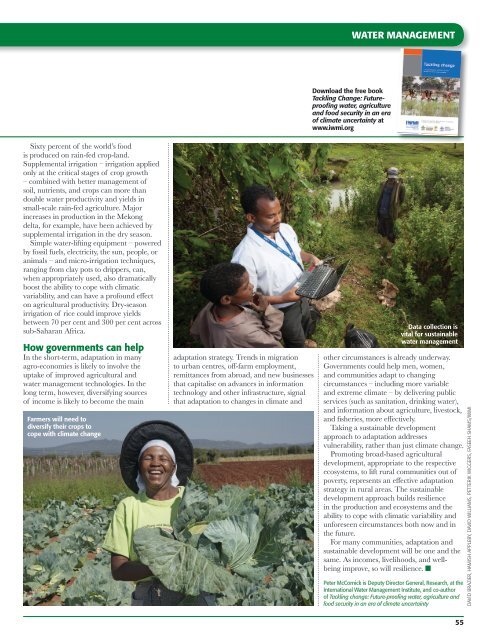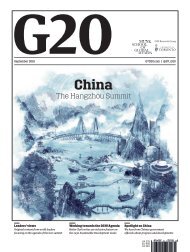SOURCE: Sustainable Development
SOURCE Sustainable Development magazine will be exploring the post 2015 international development landscape. It will engage the private sector to drive innovation and support the ever growing need to achieve the UN Sustainable Development goal’s
SOURCE Sustainable Development magazine
will be exploring the post 2015 international
development landscape.
It will engage the private sector to drive
innovation and support the ever growing
need to achieve the UN Sustainable
Development goal’s
Create successful ePaper yourself
Turn your PDF publications into a flip-book with our unique Google optimized e-Paper software.
WATER MANAGEMENT<br />
Download the free book<br />
Tackling Change: Futureproofing<br />
water, agriculture<br />
and food security in an era<br />
of climate uncertainty at<br />
www.iwmi.org<br />
Sixty percent of the world’s food<br />
is produced on rain-fed crop-land.<br />
Supplemental irrigation – irrigation applied<br />
only at the critical stages of crop growth<br />
– combined with better management of<br />
soil, nutrients, and crops can more than<br />
double water productivity and yields in<br />
small-scale rain-fed agriculture. Major<br />
increases in production in the Mekong<br />
delta, for example, have been achieved by<br />
supplemental irrigation in the dry season.<br />
Simple water-lifting equipment – powered<br />
by fossil fuels, electricity, the sun, people, or<br />
animals – and micro-irrigation techniques,<br />
ranging from clay pots to drippers, can,<br />
when appropriately used, also dramatically<br />
boost the ability to cope with climatic<br />
variability, and can have a profound effect<br />
on agricultural productivity. Dry-season<br />
irrigation of rice could improve yields<br />
between 70 per cent and 300 per cent across<br />
sub-Saharan Africa.<br />
How governments can help<br />
In the short-term, adaptation in many<br />
agro-economies is likely to involve the<br />
uptake of improved agricultural and<br />
water management technologies. In the<br />
long term, however, diversifying sources<br />
of income is likely to become the main<br />
Farmers will need to<br />
diversify their crops to<br />
cope with climate change<br />
adaptation strategy. Trends in migration<br />
to urban centres, off-farm employment,<br />
remittances from abroad, and new businesses<br />
that capitalise on advances in information<br />
technology and other infrastructure, signal<br />
that adaptation to changes in climate and<br />
Data collection is<br />
vital for sustainable<br />
water management<br />
other circumstances is already underway.<br />
Governments could help men, women,<br />
and communities adapt to changing<br />
circumstances – including more variable<br />
and extreme climate – by delivering public<br />
services (such as sanitation, drinking water),<br />
and information about agriculture, livestock,<br />
and fisheries, more effectively.<br />
Taking a sustainable development<br />
approach to adaptation addresses<br />
vulnerability, rather than just climate change.<br />
Promoting broad-based agricultural<br />
development, appropriate to the respective<br />
ecosystems, to lift rural communities out of<br />
poverty, represents an effective adaptation<br />
strategy in rural areas. The sustainable<br />
development approach builds resilience<br />
in the production and ecosystems and the<br />
ability to cope with climatic variability and<br />
unforeseen circumstances both now and in<br />
the future.<br />
For many communities, adaptation and<br />
sustainable development will be one and the<br />
same. As incomes, livelihoods, and wellbeing<br />
improve, so will resilience. ■<br />
Peter McCornick is Deputy Director General, Research, at the<br />
International Water Management Institute, and co-author<br />
of Tackling change: Future-proofing water, agriculture and<br />
food security in an era of climate uncertainty<br />
DAVID BRAZIER, HAMISH APPLEBY, DAVID WILLIAMS, PETTERIK WIGGERS, FASEEH SHAMS/IWMI<br />
55<br />
SSD_Water_Management.indd 55 04/03/2015 17:56
















